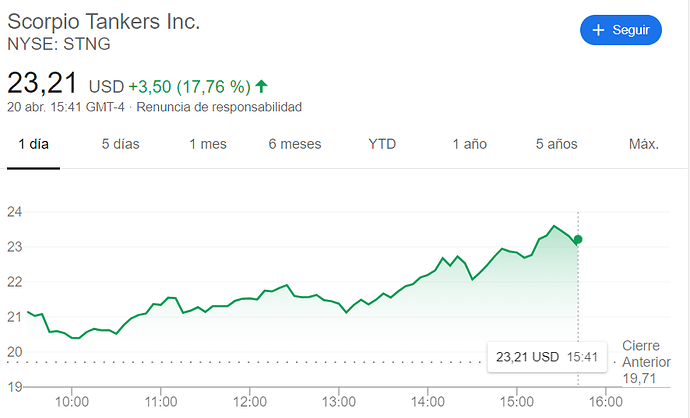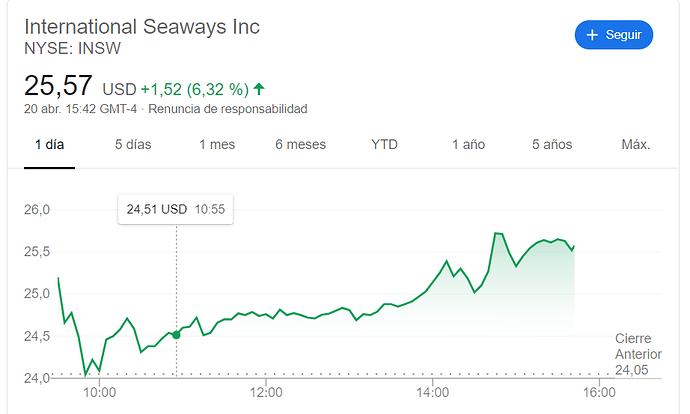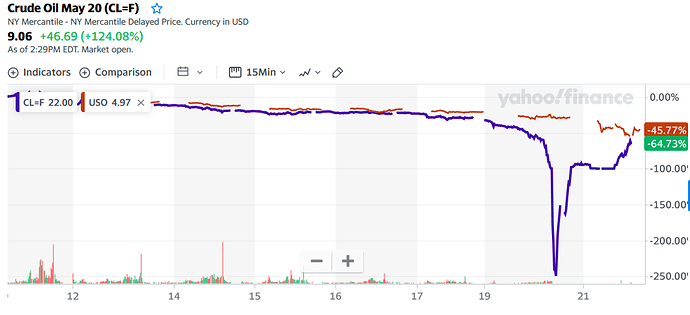Esta mañana me ha notificado Cobas que había llegado el traspaso desde Caixabank…
Rayos-C brillando en la oscuridad al lao de la puerta de Tannhauser
Puede ser algún ETF tipo CRUD a largo plazo una oportunidad.?
Product Details
The Invesco DB Oil Fund seeks to track changes, whether positive or negative, in the level of the DBIQ Optimum Yield Crude Oil Index Excess Return™ (DBIQ Opt Yield Crude Oil Index ER) plus the interest income from the Fund’s holdings of primarily US Treasury securities and money market income less the Fund’s expenses. The Fund is designed for investors who want a cost-effective and convenient way to invest in commodity futures. The Index is a rules-based index composed of futures contracts on light sweet crude oil (WTI). You cannot invest directly in the Index. The Fund and the Index are rebalanced and reconstituted annually in November.
This Fund is not suitable for all investors due to the speculative nature of an investment based upon the Fund’s trading which takes place in very volatile markets. Because an investment in futures contracts is volatile, such frequency in the movement in market prices of the underlying futures contracts could cause large losses. Please see “Risk and Other Information” and the Prospectus for additional risk disclosures.
The value of the Shares of the Fund relate directly to the value of the futures contracts and other assets held by the Fund and any fluctuation in the value of these assets could adversely affect an investment in the Fund’s Shares.
The Fund is speculative and involves a high degree of risk. An investor may lose all or substantially all of an investment in the Fund.
Commodities and futures generally are volatile and are not suitable for all investors.
Please review the prospectus for break-even figures for the Fund.
The Fund is not a mutual fund or any other type of Investment Company within the meaning of the Investment Company Act of 1940, as amended, and is not subject to regulation thereunder.
Shares in the Fund are not FDIC insured may lose value and have no bank guarantee.
This material must be accompanied or preceded by a prospectus. Please read the prospectus carefully before investing.
Because the Fund focuses on a single sector, it may experience greater volatility.
The Shares of the Fund are not deposits, interests in or obligations of any Deutsche Bank AG, Deutsche Bank AG London Branch, Deutsche Bank Securities Inc. or any of their respective subsidiaries or affiliates or any other bank (collectively, the “DB Parties”) and are not guaranteed by the DB Parties.
DBIQ Optimum Yield Crude Oil Index Excess ReturnTM and DBIQ Optimum Yield Crude Oil Index Total ReturnTM (the “Indices”) are products of Deutsche Bank AG and/or its affiliates. Information regarding these Indices is reprinted with permission. Deutsche Bank®DBTM, DBIQ® Optimum YieldTM, DBIQ Optimum Yield Crude Oil Index Excess ReturnTM and DBIQ Optimum Yield Crude Oil Index Total ReturnTM are trademarks of Deutsche Bank AG. The Indices and trademarks have been licensed for use for certain purposes by Invesco Capital Management LLC, an affiliate of Invesco Distributors, Inc. The Fund is not sponsored, endorsed, sold or promoted by DB Parties or their third party licensors and none of such parties makes any representation, express or implied, regarding the advisability of investing in the Fund, nor do such parties have any liability for errors, omissions, or interruptions in the Indices. The Indices are calculated and administered by DB Parties without regards to the Fund.
Invesco Capital Management LLC and Invesco Distributors, Inc. are not affiliated with Deutsche Bank Securities Inc.
The S&P GSCI Crude Oil Index — Total Return™ (S&P GSCI Crude Oil) is an unmanaged index used as a measurement of change in oil market conditions based on the performance of a basket of crude oil futures. S&P GSCI Crude Oil Index — Total Return™ is a trademark of Standard & Poor’s, a Division of The McGraw-Hill Companies, Inc.
Beta is a measure of risk representing how a security is expected to respond to general market movements. Smart Beta represents an alternative and selection index based methodology that seeks to outperform a benchmark or reduce portfolio risk, or both. Smart beta funds may underperform cap-weighted benchmarks and increase portfolio risk.
Recorcholis!!! Quien tuviera una piscina olímpica en el jardín… Vacía!!! 
Y digo yo, ¿se habrá enterado Pedro Sánchez? Igual sí, y me pagan por llenar el depósito del coche.
Y el Brent también cae:
… intentando comprar algún ETF de petróleo: USO, BNO… Interactive Brokers me dice que no están disponibles para el público retail en general 
¿si impiden que se pueda comprar, no están fomentando una caída en picado sin freno?
Qué raro. Yo sí he podido comprarlos.
O más concretamente vender puts sobre ellos.
Gracias Amado, ni me había dado por mirar si se podían vender opciones sobre el ETF, había dado por hecho que si no podía comprarlo/venderlo, no podía operar con opciones sobre él… madre mía que volatilidades!!! ![]()
Es por el Mifid II,
en cambio si es posible operar con opciones sobre los ETF americanos , y en consecuencia comprarlos a través de venta de Put.
En este post lo comento Operar ETFs USA con el bloqueo de MIFID II
quiere decir eso que si ejercen la opción la liquidación se hará por diferencias y no compraré el ETF?
Por favor, corríjanme si me equivoco: los ETC están compuestos por contratos de futuros. Distintos ETC pueden tener en cartera futuros con vtos. diferentes que se comportarán de forma diferente. Unos podrían subir y otros bajará por efecto del contango y del backwardation. Miren como al acercarse el vto. de ayer el ETF USO se separaba del precio del crudo, es decir, del precio de los contratos de futuros.
No no, nada de eso;
con el Mifid II se decreta que los Europeos no pueden comprar vehículos de inversión (en este caso ETF) que no tengan el folleto informativo traducido en el idioma del comprador.
Por eso razón IB, y otros broker impiden a los residentes europeos comprar Etf americanos, porqué tienen el folleto solo en inglés.
Pero, como ha comprobado, se puede operar opciones sobre estos Etfs, y si se vende una Put que expira a un precio más bajo que el precio del contrato de la opción, esta será asignada y el lunes después del vencimiento aparecerán en cartera 100 ETF comprados al precio del contrato de la opción que se ha vendido.
Opero de esta forma, de manera habitual.
Correcto.
Muchas gracias Sr. Fabala! ![]()
Ayer seguramente era muy difícil ‘comprar’ futuros con precio negativo (no que no lo tuvieran, sino que debía ser difícil encontrar contrapartida a alguien que entrara ‘nuevo’). Miren hoy se acercan los precios del ETF USO y del subyacente:
Sí, claro, vemos que la Mifid II es para ‘proteger’ a los inversores…
El petróleo en EE. UU. sale de precios negativos pero el Brent se desploma hasta niveles de 2001, Expansión (21/04/2020).
Respecto al Texas West:
Está usted comparando en el gráfico activos diferentes. El ETF a estas alturas no tenía una cartera de futuros de mayo a punto de vencer. USO ya había hecho el roll over y de hecho al menos un 20% de la cartera está siempre en el segundo vencimiento por temas regulatorios, o sea, que ahora no solo tiene contratos de junio sino también de julio.
Además, para acabar de distorsionar los precios, actualmente están prohibidos los cortos sobre USO. Actualmente parece que cotiza con una prima sobre el valor de sus activos.
Tengan cuidado con aparentes gangas. Comprar ahora supone comprar petróleo a precios históricamente muy bajos y asumir también un elevadísimo coste temporal por el contango de los futuros.




